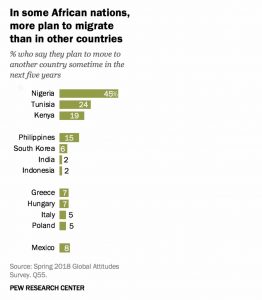It’s Crazy, But Study Finds Almost Half Of All Nigerians Want To Emigrate

A new study by the Pew Research Centre has painted a scary picture of life in Nigeria as it shows nearly half of all Nigerians are making plans to leave the country within the next five years.
The report says 45 percent of Nigerians polled say they plan to migrate, the highest of all the twelve countries surveyed. This is against 24 percent for Tunisia and 19 percent for Kenya, the other Africans whose citizen say they are desperate to migrate. As i know many would ask, ‘how many Nigerians did they speak with,’ and ‘how representative is the sample,’ you can find their methodology here.

In nations surveyed outside of Africa, fewer people say they plan to migrate. Only in the Philippines do more than one-in-ten (15%) say they plan to move to another country. The Philippines has a long history of labor migration to countries around the world. Meanwhile, relatively low shares say this in India (2%) and Mexico (8%), countries with the world’s two largest emigrant populations, the study found.
The survey conducted in 2018, also showed 55 percent of those who want to migrate have taken an initial first step in the process, coming in second behind Tunisia where 70 percent of the people polled have taken that first step. In Kenya, 50 percent of the people polled say they have taken the first step in the process.
In Tunisia, while 70 percent of those who plan to migrate in the next five years have gathered information about moving to another country, about half (54%) have saved or borrowed money, and nearly half (52%) have applied for necessary documents such as a passport or visa. A quarter of Tunisians who plan to move have taken all three steps (28%), which amounts to about 7% of all adults surveyed in the country.
In Nigeria and Kenya, lower but substantial shares have taken each of these steps to prepare for their move. About 11% of Kenyans and 14% of Nigerians who plan to migrate in the next five years have taken all three steps to prepare for their move.
Those firsts steps, the report said, include gathering information about a destination country and saving money. The reports also show that two-thirds or more of all who were surveyed cite jobs, education and reuniting with family as reasons why people leave their countries, although insecurity was also a significant factor in Nigeria and Kenya.
With a population of almost 200 million by the most recent estimates, what this research suggests is that nearly 100 million of Nigeria’s adult population want to leave the country and that should worry any right-thinking Nigerian.
Those who want to leave cite better jobs, education, reuniting with families and insecurity as reasons but the massive figure should be properly understood for what they didn’t say. To underscore the desperation, last year, a report found the number of Nigerian applicants for asylum in Canada was only second to Haiti, with many reportedly crossing from the U.S after President Donald Trump came into power.
It is true people migrate for many reasons including the one cited by those interviewed in Nigeria, all of which if looked taken at face value would suggest that people are leaving in search of better quality of life.
That would not be out of place because around the middle of last year, Nigeria officially became the poverty headquarters of the world when it overtook India as the country with the largest number of people living in extreme poverty. The findings, based on a projection by the World Poverty Clock and compiled by Brookings Institute, show that an estimated 87 million Nigerians, or around half of the country’s population, are living on less than $1.90 or N684 a day.
As I write this, the poverty clock is showing that the number of those living on less than $1.90 or N684 a day has risen by 4 million in the nine months since last year’s report.

On other measurements of the good life, the story is the same. For instance, the country ranks low (157) on the United Nation’s Human Development Index (HDI). The HDI s a statistic composite index of life expectancy, education, and per capita income indicators, which are used to rank countries into four tiers of human development. Essentially, the HDI is particularly interesting because it is based on education, financial stability, and longevity and so, what it shows is that some countries are not as livable as others.
To put this in context, think for a moment that based on the data from 2018, the five worst nations to live in are Niger (189), Central African Republic (188), South Sudan (187), Chad (186) and Burundi (185). However, Nigerian is in bad company if you look at some of the other countries that are worse off: Rwanda (158), Lesotho and Mauritania (159), Togo (165), Haiti (168) Ivory Coast (170), Liberia (181), Mali (182) and Burkina Faso (183).
By contrast, South Africa (113) Egypt (115) and Ghana (140) are ranked as medium HDI countries while Algeria (85), Tunisia (95) Botswana (101) and Libya (108) are all ranked as high HDI countries.
The Pew Research found that in Nigeria, 28% of potential migrants say they plan to move to the U.S., 19% mention a European country and 19% say a Middle Eastern country, and it’s not difficult to see why. The U.S (13), like most other European and middle eastern countries, is ranked as having very high HDI.
The best twelve countries to live in going by the HDI are Norway, Switzerland, Australia, Ireland, Germany, Iceland, Hong Kong, Sweden, Singapore, Netherlands, Denmark, and Canada in that order. The United Arab Emirates (34), Saudi Arabia (39) Bahrain (43) are also at the top-end, ranked as having very high human development.
The bottom line in all of this? Those want to migrate may have cited jobs, education, reuniting with families and insecurity as their reasons what the survey says to us is that almost half of Nigerians have lost faith in the country and what it offers them. The worrying thing is, these are not the dregs of society.
The study reports that those who intend to migrate are those with a high school diploma or higher, noting that among sub-Saharan Africans who have already relocated, about half or more of those living in the U.S. and United Kingdom have at least some college education.
The survey also found that younger adults, men and those with higher incomes are more likely to say they will make a move in the next five years. This is undoubtedly another brain drain, and I hope the authorities are taking note.












